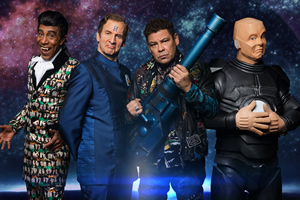Red Dwarf III retrospective: Hitting the big time
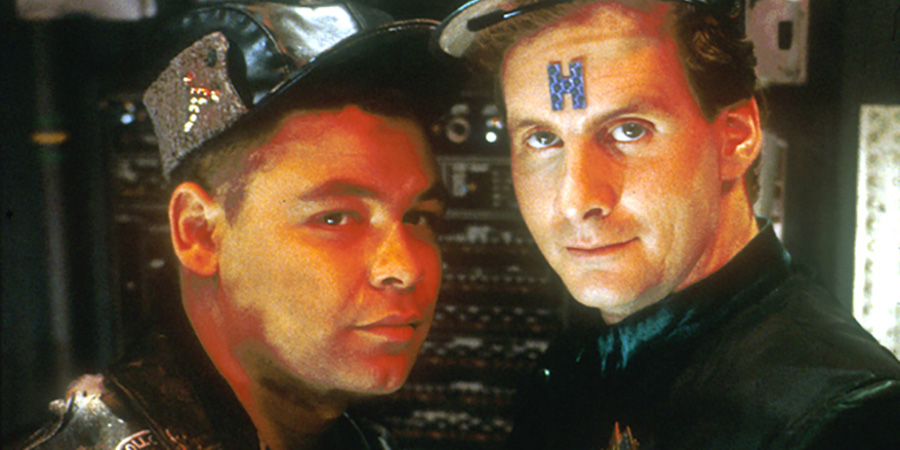
Whilst the differences between Red Dwarf I and II were fairly miniscule, the changes between Series II and III could not have been greater. In all truth, it would probably be quicker to list what didn't change between these series. With an entirely different set, new characters and a brand new dynamic, Red Dwarf III was what we might today term a 'soft reboot' of the show. It was an enormous risk to disrupt the Steptoe And Son-style dynamic that had built up between Rimmer (Chris Barrie) and Lister (Craig Charles) over the previous series, but the decision to make Red Dwarf less insular, and grander in its scope was one that more than paid off.
The show now kicked off with a big bang, namely a fast-paced new version of the theme tune we knew and loved. This was perhaps intended to sound as if Lister was rocking out on his electric guitar to the Red Dwarf theme (in typical chaotic fashion) but the session musician hired for this task handled the brief far too competently to pass for Lister's infamously bad guitar playing. Moving away from the dramatic opening titles of Series I and II was bold and it was a loss, but the new introduction did something very important: the show was now much more accessible as a fast-paced space comedy.
As well as supporting cast changes - a farewell to one Holly (Norman Lovett) and a welcome to another (Hattie Hayridge) - there was now a brand new character (or at least a brand new version of a character) as Kryten (Robert Llewellyn) arrived to complete the quartet that would become known throughout the world as 'The Boys from the Dwarf'.
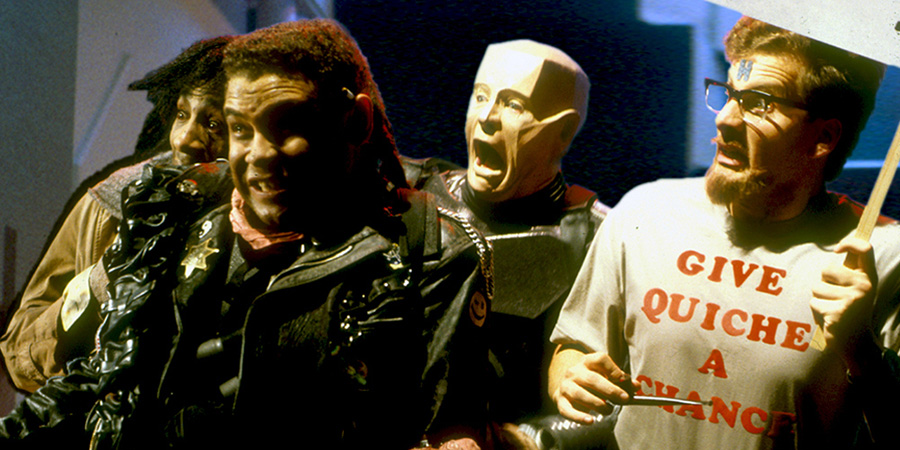
Red Dwarf's writers, Rob Grant and Doug Naylor now took control as producers, working alongside production designer Mel Bibby. The ship left behind the gunmetal grey and was instead given a cleaner look, which the whole cast preferred, and a new costume designer was brought in, Howard Burden, who heightened the look of the entire cast of characters to great effect. This was the first time we saw Lister in his now trademark leather jacket, festooned with all manner of iron-on patches and badges, in the style of Doctor Who characters of old, Lister now had a clearly identifiable look that would resonate with fans for decades to come.
The decision to bring the character of Kryten back as a full-time member of the cast, thereby upsetting the equilibrium of the original trio, was the gutsiest change of them all. Right from the start, Rob and Doug had been wary of introducing a robot. They didn't want Kryten to become a cheap C-3PO knock-off. Yet, the first appearance of Kryten, played by David Ross (in one episode of Series II), had added a certain special something that simply couldn't be ignored. He would have been cast as Kryten again if he hadn't been unavailable to reprise his role due to prior commitments.
Series I and II producer Paul Jackson had earmarked Llewellyn for the role after seeing him in a one-man Edinburgh Fringe show called Mamon, Robot Born of a Woman, where Robert had (unsurprisingly) played a robot. Little did they realise that Llewellyn's Kryten would go on to become the heart of the show, illustrated rather beautifully in the final episode of Series 3, The Last Day, in which Kryten finds he is to be replaced by a superior droid. In his honour the crew attempt to throw him one last big party before deciding that they'll attempt to take down his replacement. They eventually succeed in a Terminator-style showdown. It was all very ambitious on a tight BBC sitcom budget, particularly as the BBC's enthusiasm for science fiction was waning. Red Dwarf Series III was broadcast in 1989 just as the axe was about to fall on Doctor Who.
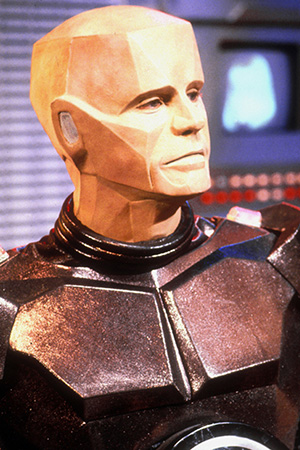
This second incarnation of Kryten remained firmly in the mould of the first (before his famous rebellion): timid, downtrodden, overly-polite and unable to call Rimmer a smeg head ('smmeee heee'). There had been much deliberation about how the new Kryten should look, act and sound. A myriad of silly walks and accents were tried out, until after much debate Kryten was given a Vancouver accent (or at least a rough approximation thereof). Chris Barrie later remarked of Llewellyn, 'I've never met a man with so much patience' as he remembered the endless costume fittings, fine-tunings of Kryten's slightly eccentric gate, and the many inflections of his voice during rehearsals.
Craig Charles observed that Kryten had taken a lot of exposition away from Holly's character, who consequently had less to explain to the crew than before. However, Hattie Hayridge became the first female voice in the regular cast, something that, on reflection, was very important for Red Dwarf. Norman Lovett had issues with filming dates for the show, so he somewhat reluctantly left the series, and Hattie's Holly (who had previously made a brief cameo in Series II as 'Hilly') took the reins. Due to the huge amount of change between the series, Holly's reimagining feels somehow in-keeping, and although Norman will always be the 'Holly' that Red Dwarf fans will more likely remember first, Hattie deserves as much recognition for her brilliant performance as the female incarnation of the ship's computer. It's a shame that we've not seen her reprise the role in any of the more recent series broadcast on Dave.
Series III consisted of six episodes, screened in the winter of 1989. They were:
Backwards
Marooned
Polymorph
Bodyswap
Timeslides
The Last Day
Marooned is widely considered one of the greatest Red Dwarf episodes of all time, and certainly the greatest character piece for the original starring duo of Lister and Rimmer. Both Craig Charles and Chris Barrie have named it as their favourite episode, and Craig has remarked how he would have liked to have performed it as a two-man stage show. It was indeed a very theatrical script. Rob and Doug had been directly influenced by the classic comedy writers Galton & Simpson (who famously wrote Hancock's Half Hour and Steptoe And Son), and that inspiration is abundantly clear in this tightly-scripted episode.
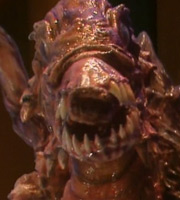
Elsewhere in the series, the episode, Polymorph brought about an iconic Red Dwarf moment - namely, Kryten trying to remove Lister's boxer shorts. This made the studio audience go crazy: the laughter was so raucous that both Craig Charles and Robert Llewellyn were shouting their lines to each other, and after post-production the level of laughter still couldn't be toned down enough to make their lines completely audible. If someone ever doubts the authenticity of a live studio audience, then show them this scene.
Timeslides brought us an innovative take on time travel: an ability to visit and change history, but only inside the small confines of a photograph. And we met a younger Lister (Emile Charles, actually Craig's real-life younger brother).
Meanwhile, Backwards remains one of the most instantly recognisable episodes of Red Dwarf. It again pushed the technical limitations of the show's relatively low budget, with ambitious location shoots and new space craft models. This was the series that introduced us to Starbug. Series I and II had previously only used the 'Blue Midgets'. The new idea was to have slightly bigger 'White Midgets', but when the model makers started pitching their new design, Doug Naylor remarked, 'It looks like a bug', the designers then revealed they'd already been calling it 'Starbug', something both writers liked, so the name stuck. Starbug became arguably the most famous ship of Red Dwarf and it had been almost entirely imagined by the art department.
As the crew celebrated the end of the series there were slight nerves that there wouldn't be another. The aforementioned axing of Doctor Who had just taken place, leaving fans reeling. Elsewhere, Douglas Adams had long since taken The Hitchhiker's Guide To The Galaxy forwards with further novels after the second TV series had stalled in 1982. Rob and Doug appeared to be following suit, as a Red Dwarf novel Infinity Welcomes Careful Drivers was published just as Series III began airing on BBC2 (November 1989). Soon a best-seller, it enhanced the back stories of both Rimmer and Lister, whilst roughly following the storylines of the first two TV series; perfect for bringing new fans up-to speed and shoring up the legacy of Red Dwarf. It is strange to imagine that if the TV series had ended the books would have been the way the 'Boys from the Dwarf' continued their adventures (and they did indeed carry on for four more novels alongside the TV series).
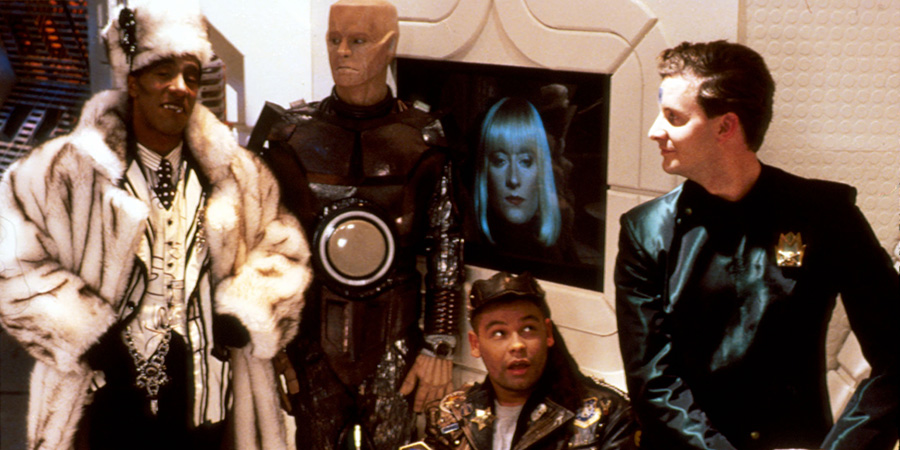
But this exclusively book-based continuation must have seemed a distinct possibility, at least for a short while. 'We always expected never to come back,' admitted Danny John-Jules during the making of Series III documentary, whilst Robert Llewellyn also admitted that they 'never expected to do any more'.
Whilst many of the cast and crew remained optimistic, there was little else even remotely similar to Red Dwarf in production in the UK. The message coming from the top at the BBC seemed to be that there was no place for science fiction. But Red Dwarf managed to slip through the net, and it was doing something truly extraordinary. It was making science fiction comedy go mainstream. Series III brought us into the show's golden era.
In the years that followed, Red Dwarf would only continue to reach new heights.
Help us publish more great content by becoming a BCG Supporter. You'll be backing our mission to champion, celebrate and promote British comedy in all its forms: past, present and future.
We understand times are tough, but if you believe in the power of laughter we'd be honoured to have you join us. Advertising doesn't cover our costs, so every single donation matters and is put to good use. Thank you.
Love comedy? Find out moreRed Dwarf III

Red Dwarf Series 3. This two-disc set maintains the high standard of presentation and wealth of extra material established by its predecessors. Among other delights there are the usual "Smeg Ups" and deleted scenes, plus another fun commentary with the cast. Most fascinating there's the opportunity to watch Backwards played forwards, so you can finally understand what Arthur Smith's backwards-talking pub manager actually says to Rimmer and Kryten in the dressing room.
First released: Monday 3rd November 2003
- Distributor: 2 Entertain
- Region: 2
- Discs: 2
- Catalogue: BBCDVD1215
![]() Buy and sell old and new items
Buy and sell old and new items
Search for this product on eBay
BCG may earn commission on sales generated through the links above.
- Released: Tuesday 2nd May 2006
- Distributor: BBC Worldwide
- Region: 1
- Discs: 2
- Minutes: 180
![]() Buy and sell old and new items
Buy and sell old and new items
Search for this product on eBay
BCG may earn commission on sales generated through the links above.
- Released: Monday 12th September 2016
- Distributor: BBC Worldwide
BCG may earn commission on sales generated through the links above.
Red Dwarf - Complete Series I - VIII

For the first time, own the first eight series of the smash hit British comedy on Blu-ray - remastered in high-definition.
Chicken soup machine repairman and intergalactic loser Dave Lister awakes from suspended animation to discover he is the lone survivor of a radiation leak and is now three million years into deep space and the last surviving member of the human race.
Dave is soon joined by Arnold J. Rimmer, a hologram of his dead bunk-mate, a life-form who's evolved from his pet cat and Kryten, a neurotic sanitation mechanoid. Together this unlikely bunch of heroes attempt to find their way back to Earth, under the guidance of Holly, the ship's senile computer. Along the way they'll be brought back to reality, lose their mothership, become stranded on Starbug, bump into Lister's ex-girlfriend and find themselves back on Red Dwarf where the original crew have been resurrected by nanobots.
First released: Monday 14th January 2019
- Distributor: BBC
- Region: B
- Discs: 19
- Minutes: 1,466
- Subtitles: English
- Catalogue: BBCBD0441
![]() Buy and sell old and new items
Buy and sell old and new items
Search for this product on eBay
BCG may earn commission on sales generated through the links above.
Red Dwarf: Infinity Welcomes Careful Drivers

A novel based on BBC2's cult comedy series, written by the writers of the Spitting Image Book. Its humour features the epic adventures of a huge clapped-out old space ship with an equally clapped-out crew.
First published: Thursday 2nd November 1989
- Published: Tuesday 17th June 2008
- Publisher: Laughing Stock
- Minutes: 495
![]() Buy and sell old and new items
Buy and sell old and new items
Search for this product on eBay
BCG may earn commission on sales generated through the links above.
- Publisher: Penguin Books
- Pages: 304
- Catalogue: 9780140124378
![]() Buy and sell old and new items
Buy and sell old and new items
Search for this product on eBay
BCG may earn commission on sales generated through the links above.
- Published: Monday 23rd June 1997
- Publisher: Laughing Stock
- Catalogue: 9781897774106
![]() Buy and sell old and new items
Buy and sell old and new items
Search for this product on eBay
BCG may earn commission on sales generated through the links above.

